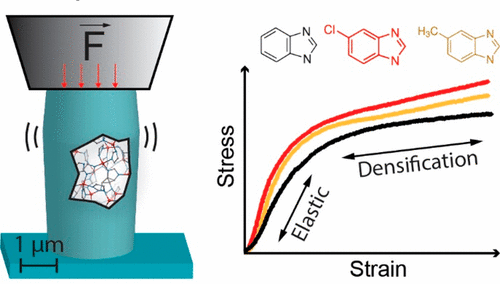当前位置:
X-MOL 学术
›
J. Am. Chem. Soc.
›
论文详情
Our official English website, www.x-mol.net, welcomes your feedback! (Note: you will need to create a separate account there.)
Plasticity of Metal–Organic Framework Glasses
Journal of the American Chemical Society ( IF 15.0 ) Pub Date : 2021-12-02 , DOI: 10.1021/jacs.1c08368 Remo N Widmer 1 , Alice M Bumstead 2 , Manish Jain 1 , Thomas D Bennett 2 , Johann Michler 1
Journal of the American Chemical Society ( IF 15.0 ) Pub Date : 2021-12-02 , DOI: 10.1021/jacs.1c08368 Remo N Widmer 1 , Alice M Bumstead 2 , Manish Jain 1 , Thomas D Bennett 2 , Johann Michler 1
Affiliation

|
Metal–organic framework (MOF) glasses provide new perspectives on many material properties due to their unique chemical and structural nature. Their mechanical properties are of particular interest because glasses are inherently brittle, which limits their applications as structural materials. Here we perform strain-rate-dependent uniaxial micropillar compression experiments on agZIF-62, agZIF-UC-5, and agTIF-4, a series of MOF glasses with different substituting linker molecules, and find that these glasses show substantial plasticity, at least on the micrometer scale. At a quasi-static strain rate of 0.001 s–1, the micropillars yielded at approximately 0.32 GPa and subsequently deformed plastically up to 35% strain, irrespective of the type of substituting linker. With increasing strain rate, the yield strength of agZIF-62 evolved with the strain-rate sensitivity m = 0.024 to reach a yield strength of 0.44 GPa at a strain rate of 510 s–1. On the basis of this relatively low strain-rate sensitivity and the absence of serrated flow, we conclude that structural densification is the predominant mechanism that accommodates such extensive plasticity.
中文翻译:

金属-有机骨架玻璃的可塑性
由于其独特的化学和结构性质,金属有机框架 (MOF) 玻璃为许多材料特性提供了新的视角。它们的机械性能特别令人感兴趣,因为玻璃本身很脆,这限制了它们作为结构材料的应用。在这里,我们执行应变速率依赖性单轴微柱压缩实验一克ZIF-62,一克ZIF-UC-5,和一克TIF-4,一系列MOF眼镜具有不同代的接头分子,并且发现,这些玻璃显示出显着的可塑性,至少在微米尺度上。准静态应变率为 0.001 s –1,无论替代接头的类型如何,微柱在大约 0.32 GPa 下屈服,随后塑性变形高达 35% 应变。随应变率,屈服强度一克ZIF-62与应变率敏感性演进米= 0.024在510个s的应变速率达到0.44 GPa的屈服强度-1。基于这种相对较低的应变率敏感性和没有锯齿状流动,我们得出结论,结构致密化是适应这种广泛塑性的主要机制。
更新日期:2021-12-15
中文翻译:

金属-有机骨架玻璃的可塑性
由于其独特的化学和结构性质,金属有机框架 (MOF) 玻璃为许多材料特性提供了新的视角。它们的机械性能特别令人感兴趣,因为玻璃本身很脆,这限制了它们作为结构材料的应用。在这里,我们执行应变速率依赖性单轴微柱压缩实验一克ZIF-62,一克ZIF-UC-5,和一克TIF-4,一系列MOF眼镜具有不同代的接头分子,并且发现,这些玻璃显示出显着的可塑性,至少在微米尺度上。准静态应变率为 0.001 s –1,无论替代接头的类型如何,微柱在大约 0.32 GPa 下屈服,随后塑性变形高达 35% 应变。随应变率,屈服强度一克ZIF-62与应变率敏感性演进米= 0.024在510个s的应变速率达到0.44 GPa的屈服强度-1。基于这种相对较低的应变率敏感性和没有锯齿状流动,我们得出结论,结构致密化是适应这种广泛塑性的主要机制。



























 京公网安备 11010802027423号
京公网安备 11010802027423号